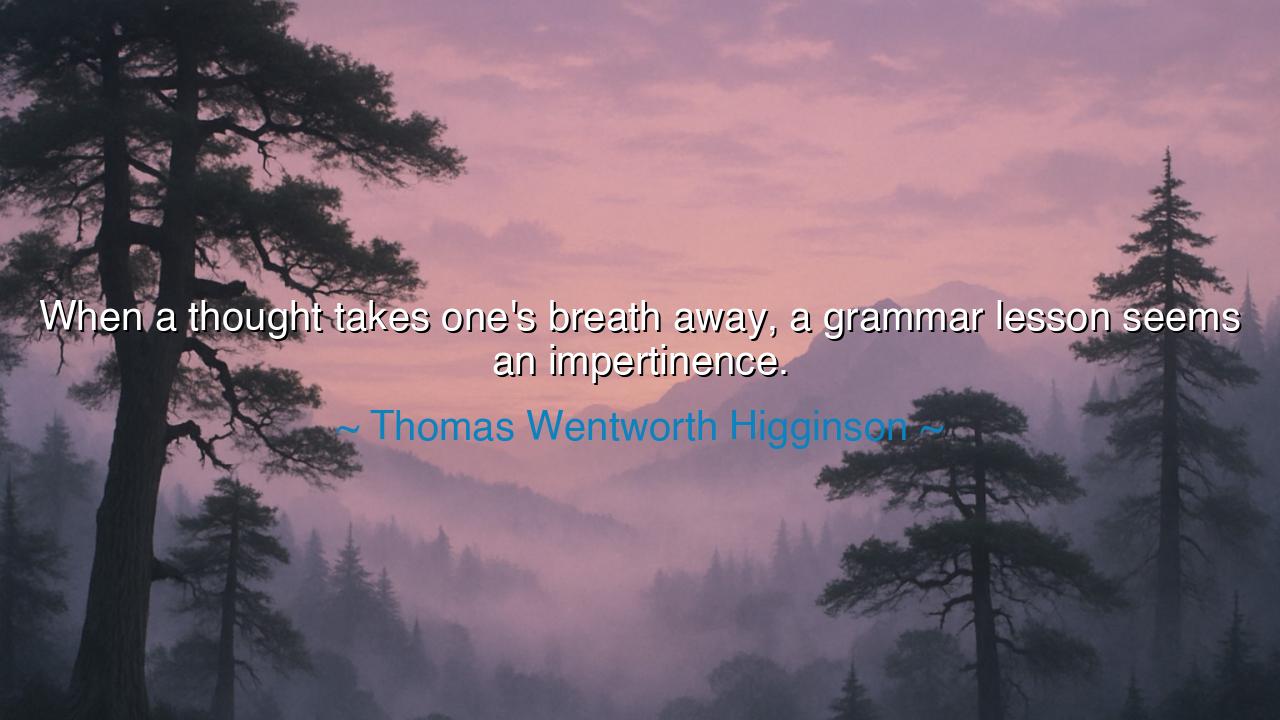
When a thought takes one's breath away, a grammar lesson seems an






The words of Thomas Wentworth Higginson — “When a thought takes one’s breath away, a grammar lesson seems an impertinence.” — are not simply about language, but about the divine fire of inspiration. They remind us that the purpose of expression is not perfection, but revelation. Higginson, a 19th-century essayist, minister, and mentor to Emily Dickinson, understood that the soul’s highest utterances cannot always be bound by rules. When a thought is so profound that it shakes the heart, when an idea arrives like lightning from the heavens, then the small laws of syntax and form fall silent before the majesty of meaning.
To take one’s breath away — this is the measure of a thought that transcends structure. It is the moment when the mind catches a glimpse of truth so radiant that words struggle to contain it. In such moments, Higginson says, grammar becomes an impertinence — a triviality, an interruption. For what are commas and clauses beside the thunder of revelation? When language becomes alive with passion, when it bears the pulse of the eternal, the critic’s red ink fades to nothing. The ancients knew this well: the poet’s role was not to obey grammar, but to channel the gods.
The origin of this quote lies in Higginson’s own love of literature and his reverence for the creative spirit. As the man who corresponded with Emily Dickinson, he witnessed firsthand a writer whose genius defied convention. Her poems broke every grammatical law of her age — dashes where none should be, capital letters that danced unpredictably — and yet, her words shimmered with power. Higginson at first tried to correct her; he suggested changes, improvements, polish. But over time, he realized that her irregularities were not flaws but flames — expressions of a mind too vast to be contained by the narrow lanes of literary decorum. It was then that he came to see that beauty and truth outrank precision.
Throughout history, the same truth has echoed through art, science, and faith. Galileo, condemned for speaking of the earth’s motion, was told that his words broke the grammar of theology — yet his ideas took humanity’s breath away. Van Gogh, painting with colors that defied the rules of realism, broke the grammar of art — yet his brush spoke to eternity. And in music, Beethoven, when deaf and despairing, composed sounds that shattered the grammar of composition, yet lifted the soul beyond the reach of speech. Each of these creators understood that true genius sometimes must violate convention to reveal truth.
To live by Higginson’s teaching, then, is to honor substance over style, essence over elegance. This does not mean that discipline or craft are worthless; they are the scaffolds by which thought climbs toward form. But there comes a moment when the structure must yield to the spirit. A thought that moves the heart is greater than one that merely pleases the grammarian. As the ancients taught, the aim of art and thought is not correctness, but communion — to connect one soul to another across the silence of time.
Higginson’s words also carry a moral echo. He reminds us not to stifle inspiration with the fear of imperfection. How often does a person, trembling before the act of expression — the poem unwritten, the truth unspoken, the idea unshared — silence themselves because they do not “know enough”? Yet the world is not changed by the cautious, but by those whose passion outruns their polish. Speak, he says, even if your grammar falters — for a living truth is worth more than a flawless emptiness.
So, O seeker of truth, remember this: when a thought burns bright within you, do not stop to ask whether it follows the rules. Let it live, breathe, and move as it must. Write with fire, speak with courage, dream without apology. The rules can be learned later — or perhaps never at all. For as Thomas Wentworth Higginson knew, the world does not remember those who wrote perfectly, but those who dared to think magnificently. When the spirit speaks, let grammar be silent; for what is form, when the soul has found its voice?






AAdministratorAdministrator
Welcome, honored guests. Please leave a comment, we will respond soon